The majestic Empire State Building, now the Grand Old Lady of the New York City skyline, opened amid great civic fanfare just 14 months after construction on it began on this day in history, May 1, 1931.
The skyscraper “must long remain one of the outstanding glories of a great city,” President Herbert Hoover said, flipping a ceremonial switch in Washington, D.C., as the 102-story tower in the heart of New York City was illuminated for the first time.
She stood — and still stands — 1,250 feet tall, towering up to 1,454 feet as topped out by its gleaming antenna.
It was the tallest building in the world for 40 years and an instant sensation.
“The appeal to the layman is enormously palpable,” The New Yorker magazine wrote, noting that its creators “endowed it with such purity of line, such subtle uses of material, that we believe it will be studied by many generations of architects.”

A construction worker bolts beams during construction of the Empire State Building, New York City, circa 1930. In the background and to the right is the Chrysler Building. (Lewis Hine/National Archive/Newsmakers)
The Empire State Building rose from the footprint of the former Waldorf-Astoria Hotel on Fifth Avenue, between 34th and 33rd Streets, with astounding speed: It took just 410 days from foundation to completion.
“The appeal to the layman is enormously palpable.” — The New Yorker, 1931
As many as 3,400 workers manned the job site each day, erecting up to 4½ floors per week at the frenetic height of construction, according to the website of the Empire State Building.
“From the ruins, lonely and inexplicable as the sphinx, rose the Empire State Building,” wrote celebrated author F. Scott Fitzgerald in a collection of essays called “My Lost City.”
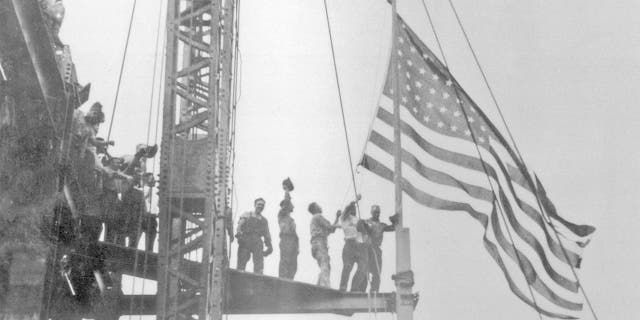
Construction workers celebrate the completion of the iron work on the Empire State Building, Manhattan, circa 1930. (FPG/Hulton Archive/Getty Images)
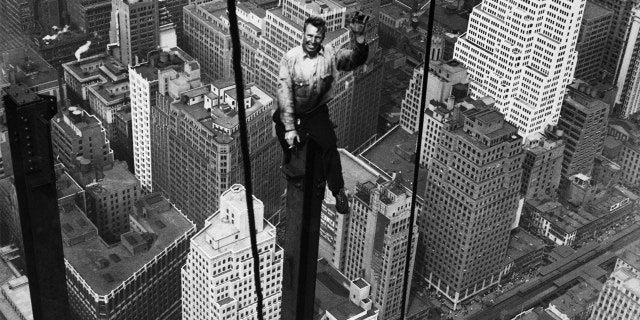
Carl Russell waves to co-workers on the structural work of the 88th floor of the new Empire State Building. The highest man-made structure in the world at the time would rise 1,222 feet above the intersection of Fifth Avenue and 34th Street. The cameraman risked his life climbing a derrick to snap this unusual photograph. Notice the “toy” cars and the ant-sized pedestrians walking about Herald Square almost a quarter of a mile below. (Getty Images)
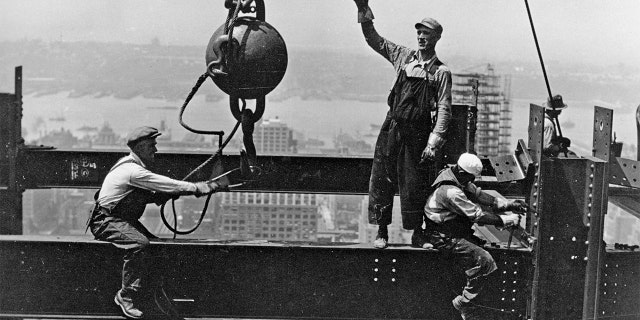
A photograph by Lewis Wickes Hine (1874-1940), showing members of a derrick gang fixing a beam during the construction of the Empire State Building, with the streets of New York far below them, circa 1931. (SSPL/Getty Images)
The scope of construction is still unfathomable.
The Empire State Building was built with 10 million bricks, 200,000 cubic feet of Indiana limestone, 6,400 windows and 37 million cubic feet of space.
That’s according to John Tauranac, author of “The Empire State Building: The Making of a Landmark.”
Alfred E. Smith, former governor of New York — who lost his bid for the White House to Hoover in November 1928 — presided over the opening celebration.
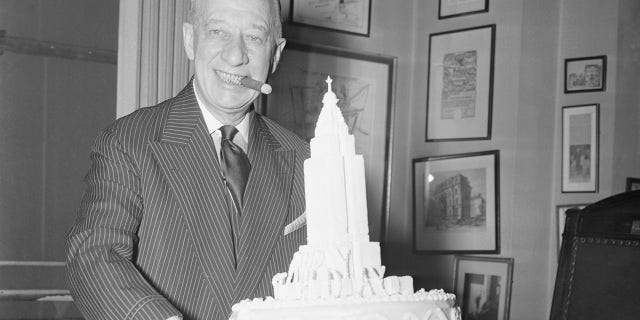
Alfred E. Smith, former New York governor and 1928 presidential candidate, headed Empire State Inc., the company that built the Empire State Building over a remarkably short period of time. (Getty Images)
Facing personal depression in wake of the political loss, he was soon encouraged by General Motors executive John Jakob Raskob to head Empire State Inc., with the goal of building the world’s tallest skyscraper.
“From the ruins, lonely and inexplicable as the sphinx, rose the Empire State Building.” — F. Scott Fitzgerald
Their agreement came in October 1929, just as the stock market crash was about to help plunge the United States, and much of the western world, into the Great Depression.
“The building was boldly planned, and although the exigencies of the stock market crash halted other projects, work on the Empire State went forward at a record pace,” writes Tauranac.
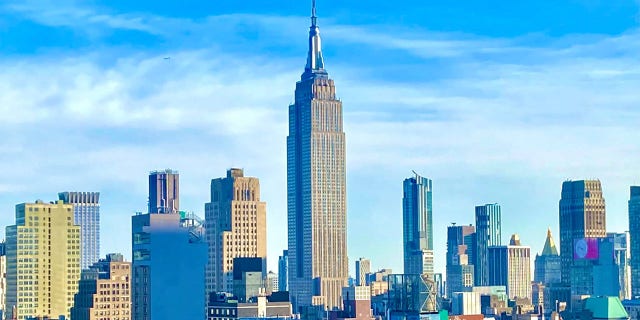
The Empire State Building, as seen from the 42nd floor of a residential building on 42nd Street, standing singularly over Midtown Manhattan. (Kerry J. Byrne/Fox News Digital)
The site of the Empire State Building has a history of grandeur.
It was built on the site of a former Manhattan landmark, the original Waldorf-Astoria Hotel, the largest, most luxurious hotel in the world at the time.
The hotel itself was originally two separate hotels. They were built on the footprints of side-by-side mansions owned by William Waldorf Astor and his aunt, Caroline Schermerhorn Astor.
Gen. George Washington’s Continental Army reportedly camped on the same spot, or proximity to it, before losing the Battle of Kips Bay and being chased from Manhattan in 1776.
One person famously missed the opening ceremony on May 1. That was architect William F. Lamb, who took Raskob’s ambitious idea and turned into gorgeous vision of steel, glass and limestone.
He went sailing for Europe that day and admired his work from afar as the celebration proceeded on land, according to author marker Mark Kingwell in his 2006 book “Nearest Thing to Heaven: The Empire State Building and American Dreams.”
“Three miles out, and so past the Prohibition boundary, he poured two martinis from a chrome shaker, pointed at the building visible in the distance, and said to his wife, ‘Isn’t this marvelous? Here we are and we don’t have to go the party and listen to all those speeches,’” Kingwell wrote.
“He poured two martinis from a chrome shaker [and] pointed at the building visible in the distance …”
The Empire State Building is widely and pervasively cited as an example of art deco design.
But the architect himself did not approve of that categorization.
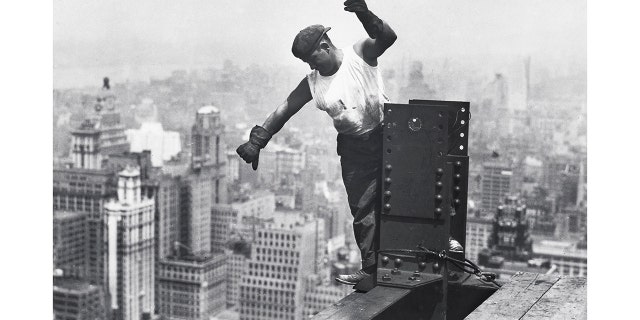
A photograph by Lewis Wickes Hine (1874-1940), showing a worker during construction of the Empire State Building in New York City, 1931. (SSPL/Getty Images)
“I don’t consider it Art Deco, and neither did Bill,” his wife, Cuthbert, told the Art Deco Society of New York after his death.
“He didn’t actually talk about the Empire State being Art Deco or not, it’s just that he never considered himself Art Deco.”
The Empire State Building lost its claims as the world’s tallest skyscraper when it was surpassed by the World Trade Center Towers in 1971 — and then by dozens of other skyscrapers around the world since.
There are six buildings in New York City alone now taller.
But the Grand Old Lady has never lost her luster in the eye of the world.
“She is a global symbol of risks taken and dreams fulfilled.” — Empire State Realty Trust chairman Anthony Malkin
She’s visited by 4 million people per year, and was named the No. 1 attraction in the United States last year by the Tripadvisor Travelers’ Choice Awards.
The Empire State Building remains, by many accounts, the most famous building in the world.
“She is a global symbol of risks taken and dreams fulfilled,” Empire State Realty Trust chairman Anthony Malkin, the building’s current owner, told Fox News Digital.
“She lives in the hearts and imaginations of all peoples, cultures and ages, as cutting edge today as the day she opened.”
